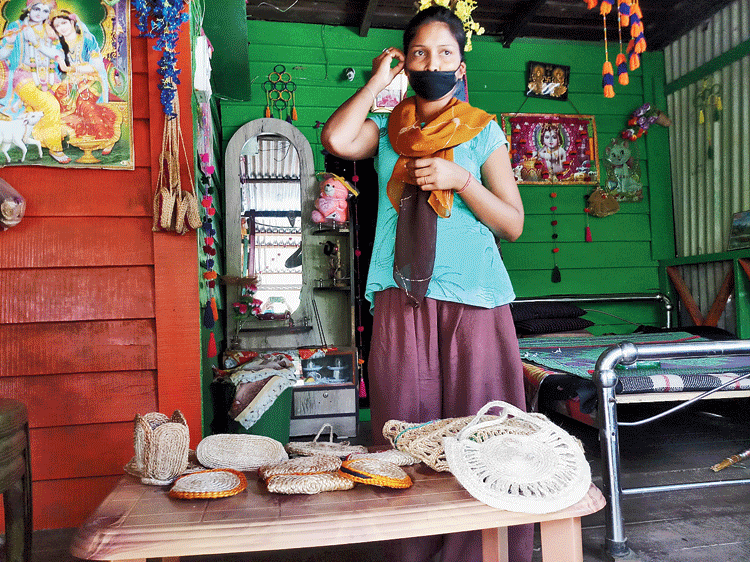The dhamsa or the traditional drum has been silent for three months at the house of Malati Kora at Bichabhanga, a forest village on the fringes of the Gorumara National Park in Jalpaiguri.
Malati, 28, member of a Santhal dance troupe and a skilled worker who makes jute handicraft items, is finding it hard to arrange two square meals for her family.
Since mid-March, she and her troupe members have not performed even once. Malati also could not find a single buyer for her jute products.
Tourists have not visited the Dooars this summer, courtesy the Covid-19 pandemic and nationwide lockdown.
In the Dooars, there are over 500 tribal artistes like Malati, who make a living by performing in the resorts dotting the region to entertain tourists.
“We performed for the last time on March 17,” Malati told The Telegraph. “It is our main source of income. Tourists stopped coming because of the lockdown and resorts are shut. We are somehow subsisting on food grains given by the government,” said Malati.
In and around Lataguri, with the highest concentration of resorts in the Dooars, hundreds of boys and girls in villages and tea estates like Murti, Panjhora, Budhuram, Bichabhanga, Saraswatipur and Kalamati are associated with dance performances.
Each troupe has 10 members. Troupes visit resorts and accommodations owned by the tourism department in and around Lataguri.
“During the peak season, on a single day, a troupe can earn Rs 10,000 to Rs 15,000. The entire amount is assembled by the Joint Forest Management Committees (JFMCs) and distributed among troupes at the end of a month. Troupes in turn distribute the money among members,” said a source.
“Usually, we perform at tourist locations during the day and visit resorts to perform in the evening. The lockdown ended everything,” said Krishna Kora, another performer from Bichabhanga.
People like Malati who earn an extra Rs 2,000 or so a month by selling handicraft products such as bags, wall hangings and ornaments to tourists are losing out badly. “The forest department often bought the items from us to give gifts to certain tourists. The lockdown stopped everything,” Malati rued.
Leaders of associations representing state government employees have demanded that the state forest department provide a share of its revenues for the sustenance of these people.
“All these artistes are members of JFMCs and play a major role in conserving nature and wildlife. The forest department can give a part of its earnings to help them as they are in utter distress,” said Prabir Bhattacharya, the Jalpaiguri district president of the Paschimbanga Rajya Sarkari Karmachari Federation.
Chief conservator of forests (wildlife, north) Ujjwal Ghosh said he was aware of the issue. “Forest department earnings have dried up. We are exploring options on how to help them (the dancers),” said Ghosh.

